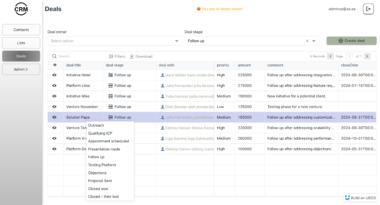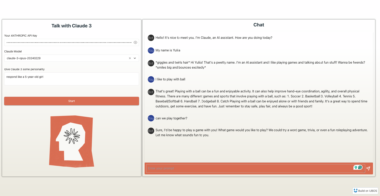Unleash the Power of LLMs with UBOS and the Python MCP Server Template
In the rapidly evolving landscape of Artificial Intelligence, Large Language Models (LLMs) are becoming indispensable tools for businesses across various industries. However, to truly harness the potential of these models, they need access to relevant, up-to-date, and contextualized information. This is where the Model Context Protocol (MCP) comes into play.
What is MCP and Why is it Important?
MCP, or Model Context Protocol, is an open standard that defines how applications can provide context to LLMs. Think of it as a universal language that allows LLMs to seamlessly interact with external data sources, tools, and applications. By providing LLMs with this contextual awareness, MCP enables them to perform more complex tasks, generate more accurate results, and deliver greater value to users.
An MCP server acts as a bridge, allowing AI models to access and interact with external data sources and tools. It handles the communication between the LLM and the outside world, ensuring that the model receives the information it needs in a structured and efficient manner.
Introducing the Python MCP Server Template
To simplify the process of building MCP servers, we introduce the Python MCP Server Template. This template provides a standardized foundation for creating MCP servers using Python, leveraging standard input/output (stdio) for seamless communication. It’s designed to integrate seamlessly with VS Code, offering a robust development environment for building and testing your MCP server.
Key Features of the Python MCP Server Template:
- Python-based: Built using Python, a widely adopted and versatile programming language, making it accessible to a broad range of developers.
- Stdio Transport: Utilizes standard input/output (stdio) for communication, ensuring reliable local development and easy integration with various platforms.
- VS Code Integration: Provides seamless integration with VS Code, offering a powerful development environment for building, testing, and debugging your MCP server.
- Example MCP Tools Implementation: Includes example implementations of MCP tools, demonstrating how to use decorators to define custom functionalities.
- Easy Debugging: Supports easy debugging with VS Code’s Python debugger, allowing you to identify and resolve issues quickly and efficiently.
- Standardized Structure: Offers a well-defined project structure, making it easy to navigate and customize the template to your specific needs.
Use Cases for the Python MCP Server Template:
The Python MCP Server Template can be used in a wide range of scenarios where you need to provide LLMs with access to external data and tools. Here are a few examples:
- Integrating LLMs with Databases: Connect LLMs to your databases to enable them to retrieve and analyze information, generate reports, and answer complex queries based on real-time data.
- Connecting LLMs to APIs: Allow LLMs to access and interact with external APIs, enabling them to perform actions such as sending emails, scheduling appointments, or retrieving data from third-party services.
- Building Custom AI Agents: Create custom AI agents that can automate tasks, provide personalized recommendations, and interact with users in a natural and intuitive way.
- Enhancing Customer Support: Integrate LLMs with your customer support systems to provide faster and more efficient support to your customers, answering their questions and resolving their issues in real-time.
- Automating Business Processes: Automate various business processes by connecting LLMs to your enterprise systems, enabling them to perform tasks such as data entry, invoice processing, and report generation.
Project Structure Explained:
The Python MCP Server Template follows a clear and organized project structure:
. ├── src/ # Python source code │ └── server.py # MCP server implementation ├── .vscode/ # VS Code configuration └── README.md # Project documentation
src/: This directory contains the Python source code for your MCP server. Theserver.pyfile contains the main implementation of the server, including the definition of MCP tools.- .vscode/: This directory contains VS Code configuration files, including settings for debugging and running your MCP server.
README.md: This file provides documentation for your project, including instructions on how to get started, customize the template, and contribute to the project.
Getting Started with the Python MCP Server Template:
Create a New Project: Use this template repository to create a new MCP server project on your local machine.
Set Up a Virtual Environment: Create and activate a Python virtual environment to isolate your project dependencies.
bash python -m venv venv source venv/bin/activate # or
venvScriptsactivateon WindowsInstall Dependencies: Install the necessary dependencies from the
requirements.txtfile.bash pip install -r requirements.txt
Customize the MCP Tools: Modify the Python code in
src/server.pyto add your custom tools using the@tooldecorator. Implement the logic for each tool to interact with your desired data sources and tools.Configure VS Code: Create a
.vscode/mcp.jsonfile with the stdio configuration to enable seamless integration with VS Code. Set up the Python interpreter in VS Code and use the integrated terminal for running commands.Test Your MCP Server: Use VS Code’s built-in MCP server testing capabilities to test your server. Debug with breakpoints and VS Code’s debug console to monitor stdio communication in the output panel.
Customization Options:
The Python MCP Server Template is designed to be highly customizable, allowing you to tailor it to your specific needs. Here are some of the customization options available:
- Add Custom Tools: Implement your own custom tools using the
@tooldecorator insrc/server.py. Define the input parameters and output format for each tool to ensure seamless integration with your LLM. - Integrate with Different Data Sources: Connect your MCP server to various data sources, such as databases, APIs, and file systems. Use appropriate libraries and APIs to retrieve and process data from these sources.
- Customize the Communication Protocol: Modify the communication protocol used by the MCP server to suit your specific requirements. While the template uses stdio by default, you can easily switch to other protocols such as TCP or HTTP.
- Add Authentication and Authorization: Implement authentication and authorization mechanisms to protect your MCP server from unauthorized access. Use industry-standard security practices to ensure the confidentiality and integrity of your data.
- Deploy to Different Environments: Deploy your MCP server to various environments, such as local machines, cloud platforms, and edge devices. Use containerization technologies such as Docker to simplify the deployment process.
Contributing to the Project:
The Python MCP Server Template is an open-source project, and contributions are welcome! If you have any ideas for improving the template, feel free to fork the repository, create a feature branch, and submit a pull request.
UBOS: The Full-Stack AI Agent Development Platform
While the Python MCP Server Template provides a solid foundation for building MCP servers, UBOS takes AI agent development to the next level. UBOS is a full-stack AI Agent Development Platform designed to help businesses orchestrate AI Agents, connect them with enterprise data, build custom AI Agents with custom LLM models, and manage Multi-Agent Systems.
With UBOS, you can:
- Orchestrate AI Agents: Easily manage and deploy AI Agents across your organization.
- Connect to Enterprise Data: Seamlessly connect your AI Agents to your existing enterprise data sources.
- Build Custom AI Agents: Create custom AI Agents tailored to your specific business needs.
- Use Your Own LLM: Build Agents with your own LLM model.
- Manage Multi-Agent Systems: Create and manage complex Multi-Agent Systems to solve challenging business problems.
By combining the Python MCP Server Template with the power of UBOS, you can unlock the full potential of LLMs and AI Agents, driving innovation and transforming your business.
In conclusion, the Python MCP Server Template provides an excellent starting point for building MCP servers that enable LLMs to access and interact with external data and tools. Whether you’re a seasoned AI developer or just getting started, this template can help you accelerate your development process and build powerful AI-powered applications. And with UBOS, you can take your AI agent development to the next level, creating intelligent systems that drive real business value.
Python MCP Server Template
Project Details
- HappyPathway/gcs-mcp-server
- Last Updated: 4/22/2025
Recomended MCP Servers

Sparkmango lets agents generate and use MCP servers from contract ABIs

Databutton MCP Server
这是一个基于 [ALAPI](https://www.alapi.cn) 的 MCP (Model Control Protocol) 服务器实现,可以通过MCP协议直接调用ALAPI的接口
AWS MCP Servers — specialized MCP servers that bring AWS best practices directly to your development workflow
Klaviyo MCP Server Enhanced with better reporting and analytics

A Model Context Protocol (MCP) server for Tripadvisor Content API. This provides access to Tripadvisor location data, reviews,...
mcp 示例
Shell and coding agent on claude desktop app
MCP
Unofficial MCP to use BrianKnows API for DeFI knowledge
 From vibe coding to vibe deployment. UBOS MCP turns ideas into infra with one message.
From vibe coding to vibe deployment. UBOS MCP turns ideas into infra with one message.





